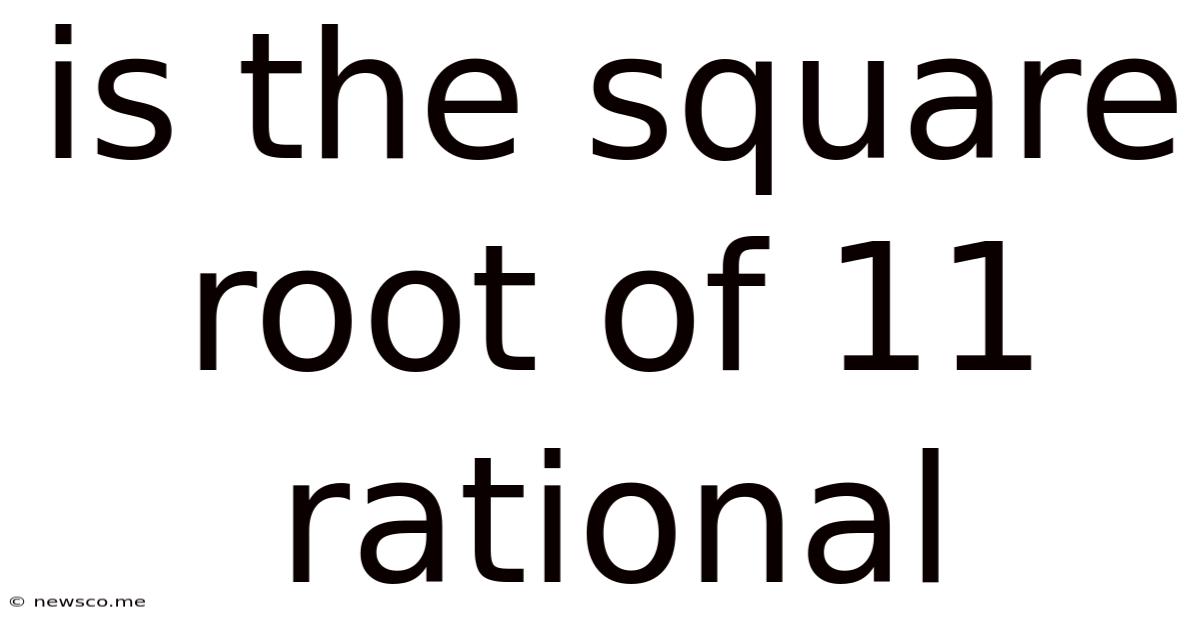Is The Square Root Of 11 Rational
News Co
Apr 14, 2025 · 5 min read

Table of Contents
Is the Square Root of 11 Rational? A Deep Dive into Irrational Numbers
The question of whether the square root of 11 is rational is a fundamental one in mathematics, touching upon the core concepts of number theory and algebraic structures. The short answer is no, the square root of 11 is irrational. But understanding why requires exploring the nature of rational and irrational numbers, and employing a method of proof by contradiction. This article will delve into these concepts, providing a comprehensive explanation accessible to a broad audience.
Understanding Rational and Irrational Numbers
Before tackling the square root of 11, let's establish a firm grasp of the definitions:
Rational Numbers: A rational number is any number that can be expressed as a fraction p/q, where 'p' and 'q' are integers (whole numbers), and 'q' is not zero. Examples include 1/2, 3/4, -5/7, and even whole numbers like 4 (which can be expressed as 4/1). The decimal representation of a rational number either terminates (like 0.75) or repeats (like 0.333...).
Irrational Numbers: Irrational numbers are numbers that cannot be expressed as a fraction of two integers. Their decimal representations are non-terminating and non-repeating. Famous examples include π (pi) and e (Euler's number). The square root of most integers is also irrational, unless the integer is a perfect square (like 4, 9, 16, etc.).
Proving the Irrationality of √11: Proof by Contradiction
We'll use the elegant method of proof by contradiction to demonstrate that √11 is irrational. This method works by assuming the opposite of what we want to prove, and then showing that this assumption leads to a logical contradiction. If the assumption leads to a contradiction, then the assumption must be false, and the original statement must be true.
Step 1: The Assumption
Let's assume, for the sake of contradiction, that √11 is rational. This means we can express it as a fraction p/q, where p and q are integers, q ≠ 0, and the fraction is in its simplest form (meaning p and q have no common factors other than 1).
Step 2: Manipulating the Equation
If √11 = p/q, then we can square both sides of the equation:
11 = p²/q²
Multiplying both sides by q², we get:
11q² = p²
Step 3: Deductions about Divisibility
This equation tells us something crucial: p² is divisible by 11. Since 11 is a prime number, this implies that 'p' itself must also be divisible by 11. We can express this as:
p = 11k (where 'k' is an integer)
Substituting this back into the equation 11q² = p², we get:
11q² = (11k)²
11q² = 121k²
Dividing both sides by 11, we obtain:
q² = 11k²
Step 4: The Contradiction
This equation now reveals that q² is also divisible by 11, and therefore, 'q' must be divisible by 11.
But here's the contradiction: We initially assumed that p/q was in its simplest form, meaning p and q share no common factors other than 1. However, we've just shown that both p and q are divisible by 11! This is a logical inconsistency.
Step 5: The Conclusion
The contradiction arises from our initial assumption that √11 is rational. Since this assumption leads to a contradiction, the assumption must be false. Therefore, our original statement—that √11 is irrational—must be true.
Exploring Further: Irrationality and Square Roots
The method used to prove the irrationality of √11 can be generalized to prove the irrationality of the square root of any non-perfect square integer. The key lies in the properties of prime numbers and divisibility. If 'n' is an integer that is not a perfect square, then √n will always be irrational.
Let's consider another example: Is √17 rational? Following the same steps as above, we would arrive at a similar contradiction, proving its irrationality. The crucial factor is that 17 is a prime number and the same logic of divisibility applies.
Real-World Implications and Applications
While the concept of irrational numbers might seem purely theoretical, they have significant real-world applications:
-
Geometry and Measurement: Irrational numbers are crucial in geometry, appearing frequently in calculations involving circles (using π), triangles, and other shapes. The diagonal of a square with sides of length 1 is √2, an irrational number.
-
Physics and Engineering: Many physical phenomena involve irrational numbers. For example, the frequency of oscillation of a pendulum often involves irrational numbers. Engineers must often work with approximations of irrational numbers in their designs.
-
Computer Science: Representing irrational numbers accurately in computers is a challenge, often leading to the use of floating-point arithmetic and approximations. Understanding the limitations of these approximations is vital for developing reliable software.
Conclusion: The Enduring Mystery of Irrational Numbers
The fact that √11 is irrational highlights the richness and complexity of the number system. While we can approximate its value to any desired degree of accuracy, we can never express it precisely as a fraction of two integers. This seemingly simple number holds a deep mathematical significance, connecting seemingly disparate areas of mathematics and impacting various fields of science and engineering. The elegant proof by contradiction showcases the power of mathematical reasoning and the beauty of logical deduction in uncovering fundamental truths about the nature of numbers. The journey of understanding irrational numbers is a testament to the ongoing exploration and refinement of mathematical knowledge.
Latest Posts
Related Post
Thank you for visiting our website which covers about Is The Square Root Of 11 Rational . We hope the information provided has been useful to you. Feel free to contact us if you have any questions or need further assistance. See you next time and don't miss to bookmark.